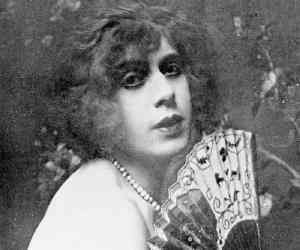Influential Figures in LGBTQ History
Recently in my Adolescent Development class, we had a speaker come to discuss the struggles that members of the LGBTQ community face within the classroom. The talk opened my eyes to the feelings of misbelonging that I myself will never truly understand as a straight woman. In a school setting, even learning becomes extremely difficult for these students due to the distractions of torment; these students often have to hide a part of who they are or face rejection for being their true selves.
To reflect upon the discussion, I worked with my classmate Vanessa Malloy in diving deeper into understanding the experience of oppression faced by members of the LGBTQ community in history and in modern society. Together, we watched both movies "The Imitation Game," and "The Danish Girl," which are both about influencial LGBTQ figures in history who faced similar struggles that members of the LGBTQ community still face today.
To summarize the stories of the actual people these movies are based upon, Vanessa and I created a short video using Adobe SparkPage, a helpful classroom tool, which can be found at this link:
The Imitation Game is based upon the life and work of Alan Turing, who worked to crack the German Enigma Code and help the Allies win WWII. In order to complete this great work, Turing needed to hide a part of himself; it was illegal to be homosexual in England at the time. In our discussion of LGBTQ students, we mentioned that being closeted is an extreme distraction from learning as any indication that could reveal their secret could come at the price of great torment. Imagine hiding this secret for the sake of a highly prestigious military position where if anyone discovered who Turing really was, he risked public humiliation, incarceration, or chemical castration. It was the latter punishment that led to Turing's eventual death, and made the world forget the great work he had done for his nation. When you are a member of the LGBTQ community, outsiders often see one part of your personality as your whole. After his conviction, Turing became only a homosexual, which was highly unaccepted at the time, and his work as a brilliant scientist was forgotten. It is only now, years and years after his pain and suffering for the sake of the greater good is over, that Turing is regaining recognition in history.
The Danish Girl tells the story of Lili Elbes, the first ever identified recipient of a sex reassignment surgery. The movie highlights how confusing it may be for people who are transgender to transition as society tells them that something is wrong with them, rather than that is who they really are. Based in 1912, the movie shows that Lili faced many doctors diagnosing her with insanity before finding one who was willing to help her case through an experimental sex reassignment surgery. Although the surgery led to her eventual death by infection, Lili died feeling as if she finally got to be who she was meant to be. Through Lili and Einas'(Lili's birth name) wife Gerda's bravery in receiving the surgery and supporting Lili's transition, Lili Elbes thus began what eventually became the modern version of the sex reassignment surgery that helps so many trans people today. Although written out of history due to homophobia, Lili Elbes truly was an inspirational example of courage to be who she was born to be.
To me, the most interesting take away from this experience was learning that the general feelings that are associated with the LGBTQ experience have, in a way, remained the same over the last 100 years. Although laws and tolerance continues to move in a positive direction, there is still a feeling of misbelonging, hiding, or rejection that is faced by members of the LGBTQ community today. Just as Alan Turing had to hide his identity to succeed, many still feel they must remain closeted to maximize their ability to learn, work, or socialize. Similarly, as Lili Elbe had the bravery to express her true self, she still faced backlash from society, which is still experienced by not only modern trans people, but by all open members of the LGBTQ community at one point or another.


Meghan, I appreciate that you went deeper and engaged in a thoughtful conversation with Vanessa AND went the extra mile to learn more about the experiences of others. Such a thoughtful entry and spark page.
ReplyDelete